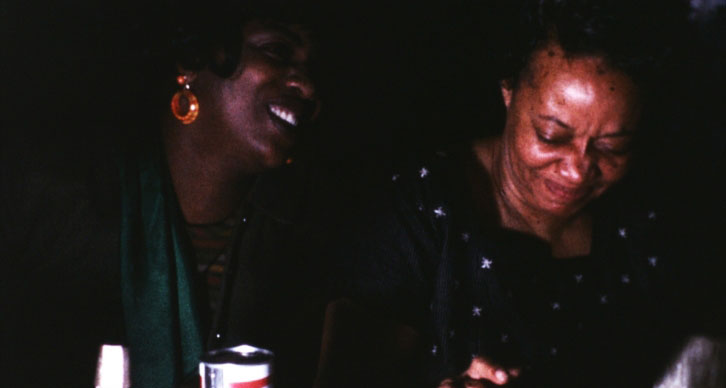
Remembrance: A Portrait Study (1967) by Edward Owens
Always Moving: African American Portraiture in Film
Curated by Gina Basso and Steve Polta
Program online March 5–31, 2021
Special livestream on Saturday, April 24, 2021 (details to come)
presented in association with the San Francisco Museum of Modern Art
Always Moving: African American Portraiture in Film presents eight historical and contemporary moving image works created 1967–2019. Engaging with traditions as diverse as ‘60s New York underground filmmaking, ‘70s left coast political manifesto, portraiture, street photography and stag film, these films frame experiences of public and community life, family history and political struggle within the contexts of African American photographic traditions and countercultural expression. Throughout, the works consider the intimate lives of strangers, friends and family and reframe representations of joy and love, struggle and resilience and the simple pleasures found in the everyday. This program was curated in 2020 and originally was to have screened April 2 (with a slightly different line-up) at SFMOMA in the context of Dawoud Bey: An American Project. (Gina Basso and Steve Polta)
SCREENING: Remembrance: A Portrait Study (1967) by Edward Owens; 16mm screened as digital video, color, sound, 6 minutes. The Orchid (1972) by Samuel R. Delany; screened as digital video, color, sound, 32 minutes. Hour Glass (1971) by Haile Gerima; 16mm screened as digital video, b&w, sound, 13 minutes. Medea (1973) by Ben Caldwell; 16mm screened as digital video, color, sound, 7 minutes. Memory Palace (2015) by Martine Syms, digital video, color, sound, 3 minutes (livestream only). Goddess (2018) by Kevin Jerome Everson; digital video, color, silent, 2 minutes (livestream only). After DeCarava (2018) by Paige Taul; digital video, b&w, silent, 2 minutes. Garden (2017) by Alima Lee; digital video, color, sound, 7 minutes.

Remembrance: A Portrait Study (1967) by Edward Owens
Remembrance: A Portrait Study is a filmic portrait of the artist’s mother, Mildered Owens, and her friends Irene Collins and Nettie Thomas, set to a score of ‘50s and ‘60s hit songs. Using Baroque lighting techniques, Owens captures the three women drinking and lounging one evening. (Tate Museum)
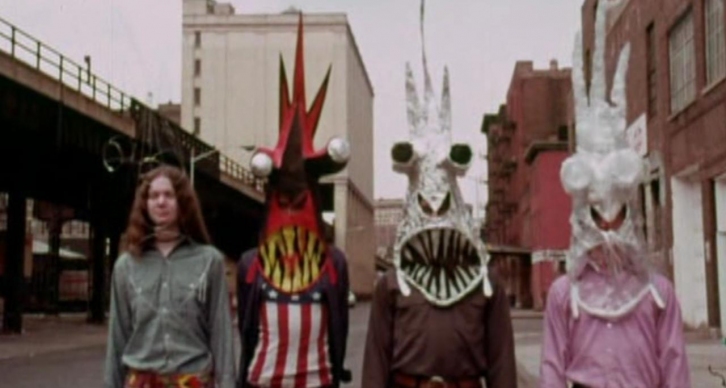
The Orchid (1972) by Samuel R. Delany
A surreal, nearly wordless odyssey through New York City, The Orchid (Delany’s sole directorial credit) premiered at the World Science Fiction Convention in 1971 where it nearly incited a riot, with Delany’s fans shouting at the screen and eventually trying to tear it down. Perhaps unprepared for a film that flirts with genre, but would have been more at home at The Judson Dance Theater (music by John Herbert McDowell, production coordination by Adolfas Mekas), the unhappy moviegoers set the tone for the film, which never found an audience willing to receive it on it’s own terms. (Nellie Killian)
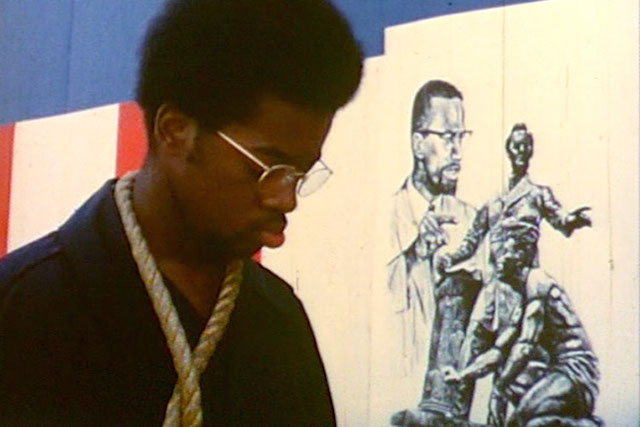
Hour Glass (1971) by Haile Gerima
A young African American male rethinks his role as a basketball player for white spectators as he begins reading the works of Third World theoreticians like Frantz Fanon and contemplates the work of Martin Luther King Jr., Malcolm X and Angela Davis. (Jan-Christopher Horak)
Digital presentation courtesy of the UCLA Film & Television Archive.
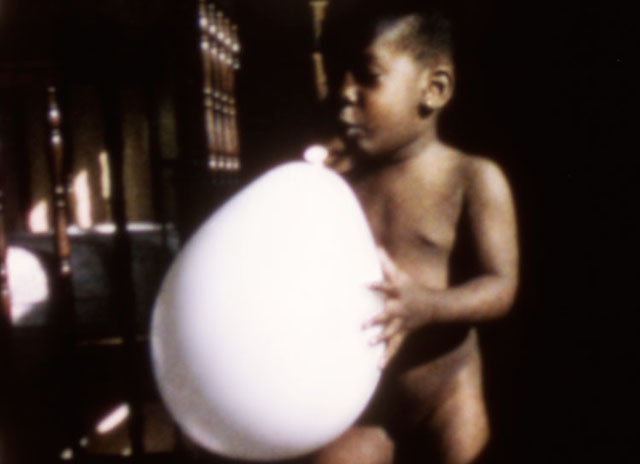
Medea (1973) by Ben Caldwell
Ben Caldwell’s Medea, a collage piece made on an animation stand and edited entirely in the camera, combines live action and rapidly edited still images of Africans and African Americans which function like flashes of history that the unborn child will inherit. Caldwell invokes Amiri Baraka’s poem Part of the Doctrine in this experimental meditation on art history, Black imagery, identity and heritage. (Allyson Nadia Field)
Digital presentation courtesy of the UCLA Film & Television Archive.
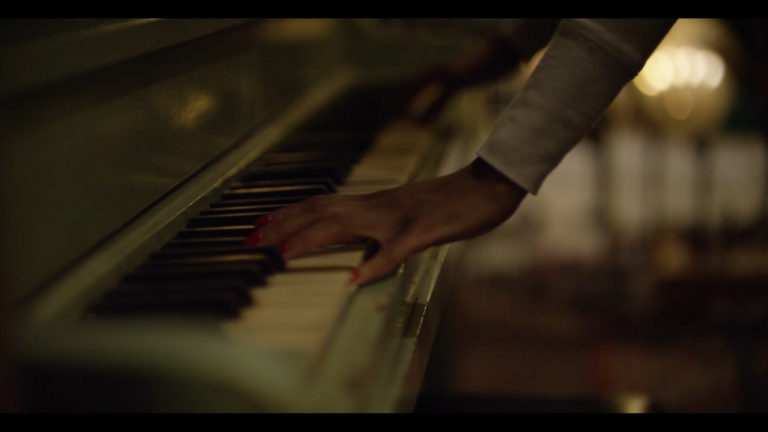
Memory Palace (2015) by Martine Syms
Memory Palace is grounded in the personal history of the artist. A discovery of a photo album activates memories of physical spaces, which in turn open doors to reminiscences of past family life. Inspired by the classical method of loci, the film presents a woman—singer/songwriter Alice Smith—at work in Los Angeles. (Video Data Bank)
Please note: this film will screen in the April 24 livestream program *only.*
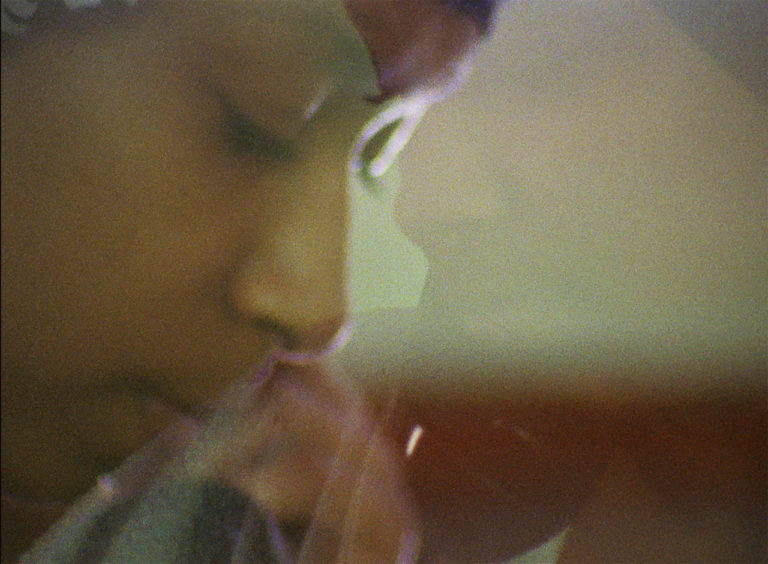
Goddess (2018) by Kevin Jerome Everson
Goddess is based on a stag film produced by American photographer Garry Winogrand and the corrupt police from the filmmaker’s home county of Richland, Ohio. (Kevin Jerome Everson)
Image copyright Kevin Jerome Everson; courtesy the artist; trilobite-arts DAC; Picture Palace Pictures.
Please note: this film will screen in the April 24 livestream program *only.*
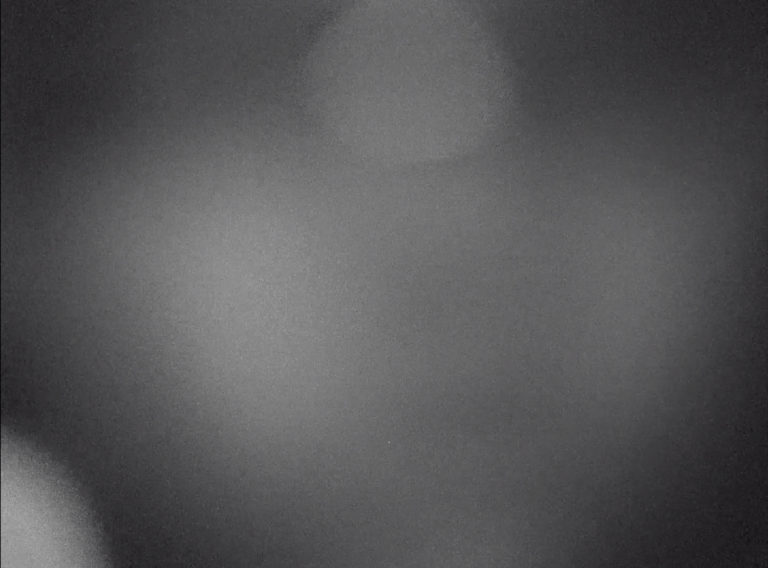
After DeCarava (2018) by Paige Taul
A tender approach to filmic abstraction mirroring the care evidenced in Roy DeCarava’s photograph Face out of focus (c. 1960). (Paige Taul)
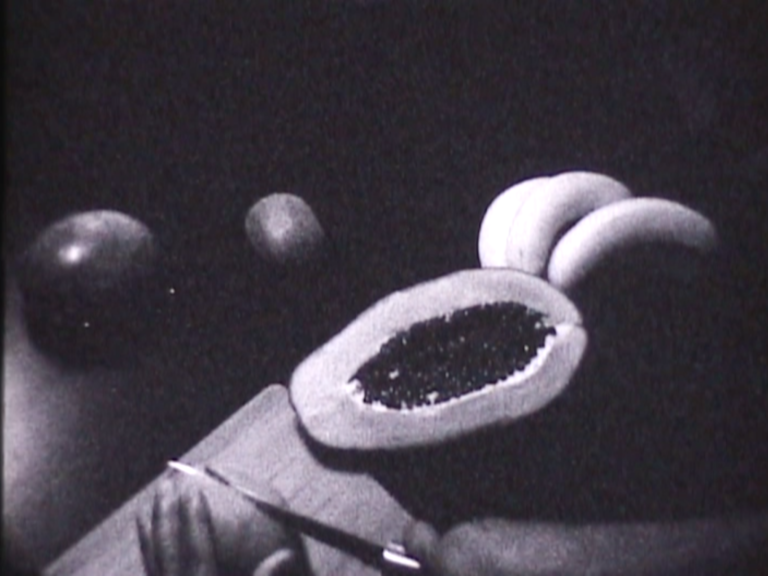
Garden (2017) by Alima Lee
Lee’s quiet and intimate film Garden focuses on black women’s healing and daily rituals needed to overcome anxiety. The protagonist struggles, yet persists, to honor herself through tasks which, however mundane, are essential for her survival, finding joy on her terms.
Artist Bios
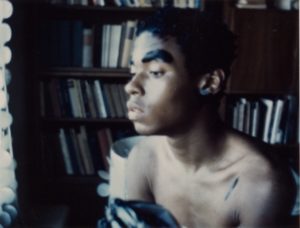 As a teenager, Edward Owens, a resident of Chicago’s South Side, spent his free time experimenting with 8mm film. He Studied painting and sculpture at the School of the Art Institute of Chicago (SAIC) and there met the experimental filmmaker Gregory Markopoulos, who had founded the school’s film program. Markopoulos was impressed with Owens’ film work and urged him to move to New York City, which he did in 1966. In New York, Markpoulous became a mentor for Owens, introducing him to influential figures in filmmaking and art such as Andy Warhol, Gerard Malanga, Marie Menken, Gregory Battcock and Charles Boultenhouse. In 1971, after making several films in New York he stopped making films and moved back to Chicago. He died in 2009 at age 60.
As a teenager, Edward Owens, a resident of Chicago’s South Side, spent his free time experimenting with 8mm film. He Studied painting and sculpture at the School of the Art Institute of Chicago (SAIC) and there met the experimental filmmaker Gregory Markopoulos, who had founded the school’s film program. Markopoulos was impressed with Owens’ film work and urged him to move to New York City, which he did in 1966. In New York, Markpoulous became a mentor for Owens, introducing him to influential figures in filmmaking and art such as Andy Warhol, Gerard Malanga, Marie Menken, Gregory Battcock and Charles Boultenhouse. In 1971, after making several films in New York he stopped making films and moved back to Chicago. He died in 2009 at age 60.
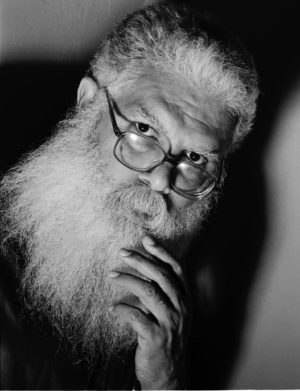 Samuel R. Delany, is an American author and literary critic. His work includes fiction (especially science fiction), memoir, criticism and essays on science fiction, literature, sexuality and society.
Samuel R. Delany, is an American author and literary critic. His work includes fiction (especially science fiction), memoir, criticism and essays on science fiction, literature, sexuality and society.
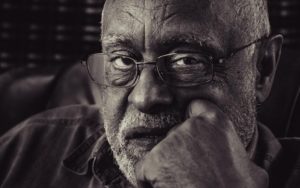 Haile Gerima is an independent filmmaker and professor of film at Howard University in Washington, DC. Born and raised in Ethiopia, Gerima emigrated to the United States in 1967. Following in the footsteps of his father, a dramatist and playwright, Gerima studied acting in Chicago before entering the UCLA School of Theater, Film and Television, where his exposure to Latin American films inspired him to mine his own cultural legacy. In 1996, Gerima founded the Sankofa Video and Bookstore in Washington, DC., a cultural and intellectual space that offers opportunities for self-expression, interaction, discussion and analysis through community events such as film screenings, book signings, scholar forums and artist showcases. Gerima continues to distribute and promote his own films, including his most recent festival success, Teza (2008), which won the Jury and Best Screenplay awards at the Venice Film Festival. He also lectures and conducts workshops in alternative screenwriting and directing both within the US and internationally.
Haile Gerima is an independent filmmaker and professor of film at Howard University in Washington, DC. Born and raised in Ethiopia, Gerima emigrated to the United States in 1967. Following in the footsteps of his father, a dramatist and playwright, Gerima studied acting in Chicago before entering the UCLA School of Theater, Film and Television, where his exposure to Latin American films inspired him to mine his own cultural legacy. In 1996, Gerima founded the Sankofa Video and Bookstore in Washington, DC., a cultural and intellectual space that offers opportunities for self-expression, interaction, discussion and analysis through community events such as film screenings, book signings, scholar forums and artist showcases. Gerima continues to distribute and promote his own films, including his most recent festival success, Teza (2008), which won the Jury and Best Screenplay awards at the Venice Film Festival. He also lectures and conducts workshops in alternative screenwriting and directing both within the US and internationally.
Arts educator and independent filmmaker Ben Caldwell grew up assisting his grandfather, who projected movies at a small theater in New Mexico. His passion for the visual arts led him to study film at UCLA and reside in the neighborhood of Leimert Park, epicenter for the African American art scene in Los Angeles. After teaching film and video at Howard University in Washington, DC 1981-84, Caldwell returned to Leimert Park and created an independent studio for video production and experimentation that became the KAOS Network, a community arts center that provides training on digital arts, media arts and multimedia.
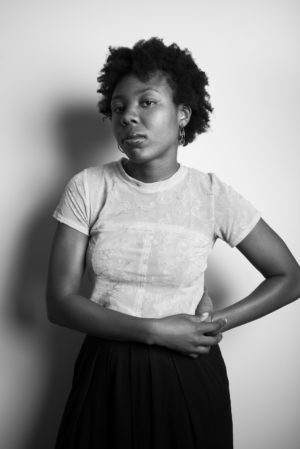 Martine Syms uses video and performance to examine representations of blackness. Her artwork has been exhibited and screened extensively, including presentations at the Museum of Modern Art, Hammer Museum, ICA London, New Museum, Museum of Contemporary Art Los Angeles and The Studio Museum in Harlem. From 2007-2011 she was the co-director of the Chicago artist-run project space Golden Age. She currently runs Dominica Publishing, an imprint dedicated to exploring blackness in visual culture, is the author of Implications and Distinctions: Format, Content and Context in Contemporary Race Film (2011).
Martine Syms uses video and performance to examine representations of blackness. Her artwork has been exhibited and screened extensively, including presentations at the Museum of Modern Art, Hammer Museum, ICA London, New Museum, Museum of Contemporary Art Los Angeles and The Studio Museum in Harlem. From 2007-2011 she was the co-director of the Chicago artist-run project space Golden Age. She currently runs Dominica Publishing, an imprint dedicated to exploring blackness in visual culture, is the author of Implications and Distinctions: Format, Content and Context in Contemporary Race Film (2011).
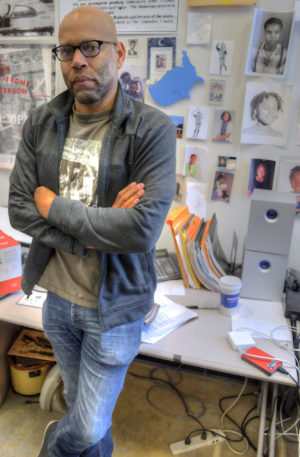 Kevin Jerome Everson (b.1965, Mansfield OH) MFA, Ohio University; BFA, University of Akron. Professor of Art at the University of Virginia, Charlottesville. Everson is the recipient of the 2020 Berlin Prize; 2019 Heinz Award in Arts & Humanities; the 2012 Alpert Award for Film/Video; the Guggenheim and the Rome Prize and grants from the Wexner Center, NEH and Creative Capital. His art practice, including sculpture, photography and films—11 features and over 180 shorts—have been the subject of mid-career retrospectives at Courtisane/Cinematek Brussels; Centre Pompidou/Cinema du Reel; Harvard Film Archive; Tate Modern; MMCA, Seoul; and the Whitney Museum of American Art and have been featured at the 2008, 2012 and 2017 Whitney Biennials, the 2013 Sharjah Biennial and the 2018 Carnegie International. Photo: Sandy Williams III
Kevin Jerome Everson (b.1965, Mansfield OH) MFA, Ohio University; BFA, University of Akron. Professor of Art at the University of Virginia, Charlottesville. Everson is the recipient of the 2020 Berlin Prize; 2019 Heinz Award in Arts & Humanities; the 2012 Alpert Award for Film/Video; the Guggenheim and the Rome Prize and grants from the Wexner Center, NEH and Creative Capital. His art practice, including sculpture, photography and films—11 features and over 180 shorts—have been the subject of mid-career retrospectives at Courtisane/Cinematek Brussels; Centre Pompidou/Cinema du Reel; Harvard Film Archive; Tate Modern; MMCA, Seoul; and the Whitney Museum of American Art and have been featured at the 2008, 2012 and 2017 Whitney Biennials, the 2013 Sharjah Biennial and the 2018 Carnegie International. Photo: Sandy Williams III
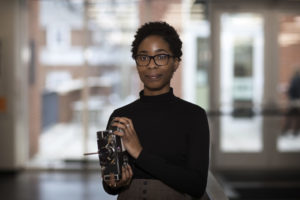 Paige Taul (b. 1996) is an Oakland CA native who received her BA in Studio Art with a concentration in Cinematography from the University of Virginia and her MFA in Moving Image from the University of Illinois at Chicago. Her work engages with and challenges assumptions of black cultural expression and notions of belonging through experimental cinematography. As a part of her filmmaking practice she tests the boundaries of identity and self-identification through autoethnography to approach notions of racial authenticity in veins such as religion, style, language and other black community based experiences. Paige’s work has been exhibited at venues including UnionDocs, CROSSROADS at SFMOMA, BlackStar Film Festival and the Virginia Film Festival.
Paige Taul (b. 1996) is an Oakland CA native who received her BA in Studio Art with a concentration in Cinematography from the University of Virginia and her MFA in Moving Image from the University of Illinois at Chicago. Her work engages with and challenges assumptions of black cultural expression and notions of belonging through experimental cinematography. As a part of her filmmaking practice she tests the boundaries of identity and self-identification through autoethnography to approach notions of racial authenticity in veins such as religion, style, language and other black community based experiences. Paige’s work has been exhibited at venues including UnionDocs, CROSSROADS at SFMOMA, BlackStar Film Festival and the Virginia Film Festival.
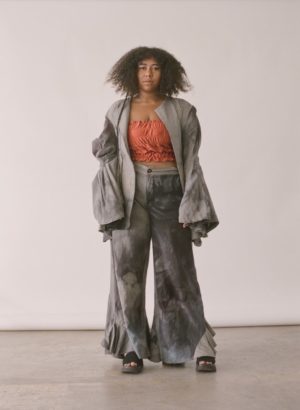 Alima Lee is a transdisciplinary artist of afrodiasporic origin from New York City, currently based in LA. Their work explores themes of identity and intersectionality. They are a recent Frieze LA x Ghetto Film School Fellow and Co-Host of a monthly radio show, Rave Reparations, on NTS. Working in an uninhibited range of mediums from video installation and performance to printmaking and sculpture, Alima is on an ever-constant freefall from structure. Their video work has been presented at HVW8 Gallery in Berlin, the Tate Modern, MOCA, the National Museum of African American History and Culture, Gavin Brown’s enterprise and ICA Boston among other global entities.
Alima Lee is a transdisciplinary artist of afrodiasporic origin from New York City, currently based in LA. Their work explores themes of identity and intersectionality. They are a recent Frieze LA x Ghetto Film School Fellow and Co-Host of a monthly radio show, Rave Reparations, on NTS. Working in an uninhibited range of mediums from video installation and performance to printmaking and sculpture, Alima is on an ever-constant freefall from structure. Their video work has been presented at HVW8 Gallery in Berlin, the Tate Modern, MOCA, the National Museum of African American History and Culture, Gavin Brown’s enterprise and ICA Boston among other global entities.